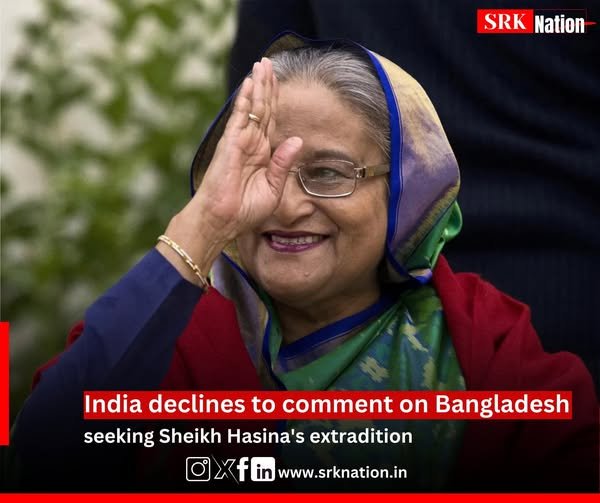Bangladesh has formally requested India to extradite former Prime Minister Sheikh Hasina, who has been living in exile since August. The request was made through a note verbale sent on Monday.
India’s Ministry of External Affairs confirmed receiving the note but declined further comment.
“We confirm that we have received a Note Verbale from the Bangladesh High Commission today in connection with an extradition request. At this time, we have no comment to offer on this matter,” said a Spokesperson of the Ministry of External Affairs, reported ANI.
A note verbale is a formal, unsigned diplomatic note that is exchanged between governments.
Bangladesh’s Foreign Affairs Adviser, Touhid Hossain, confirmed the move, stating that Hasina’s return is sought for judicial processes. Hasina fled to India following large-scale student protests in Bangladesh over a controversial job quota issue.
Bangladesh’s Foreign Affairs Adviser Hossain, who is considered the de facto foreign minister said that a note verbale had been sent to India, requesting Sheikh Hasina’s extradition for judicial proceedings. This follows a letter from Bangladesh’s Home Advisor, Jahangir Alam, asking the Indian government to facilitate Hasina’s return under a prisoner exchange agreement.
Speaking to TNIE, former IFS officers and retired high commissioners to Bangladesh Veena Sikri (2003-’06) and Pinak Ranjan Chakravarty (2007-’09) said a “note verbale is not an instrument on which extradition can be sought. India has an extradition treaty with Bangladesh. Extradition is a very long, detailed process involving the judiciary. Request for extradition comes at the end of the process,” said the former diplomats. “The requesting country has to complete the judicial process of proving the charges against the fugitive leader and convicting her,” said Sikri.
In India, the Extradition Act, 1962 under the MEA “prescribes separate procedures for handling extradition requests from different countries depending upon the procedural and evidentiary requirements envisaged in the relevant extradition treaty,” states the Extradition Act.
Meanwhile, earlier on Monday the interim government in Bangladesh issued a press statement, which was shared with Indian media, on the initiation of an enquiry into allegations of corruption, embezzlement and money laundering involved in the Rooppur Nuclear Power Plant implicating Hasina, her son Sajeeb Ahmed Wazed (Joy) and niece Tulip Siddiq for allegedly embezzling $5 billion through various offshore bank accounts in Malaysia. Earlier, the Dhaka-based International Crimes Tribunal (ICT) had issued arrest warrants for Hasina and several former Cabinet ministers, advisers, and military and civil officials for “crimes against humanity and genocide”.
Sheikh Hasina, has been living in India since August 5 after fleeing the country amidst massive student-led protests that brought an end to her 16-year regime. The Bangladesh-based International Crimes Tribunal (ICT) issued arrest warrants against her, along with several former ministers, advisers, and military and civil officials, for alleged crimes against humanity and genocide. The relationship between India and Bangladesh has soured after the interim government, led by Muhammad Yunus, came to power.
In his address to the nation marking 100 days of the interim government’s leadership, Bangladesh’s Chief Adviser Yunus had said that they would pursue Hasina’s extradition. He claimed that over 1,500 people, including students and workers, were killed during the protests, and more than 19,000 were injured. Yunus further noted that Bangladesh would strongly protest if India attempts to deny the extradition based on any provisions within the treaty.
Earlier, Yunus had criticized Hasina for making political remarks from India, calling it an “unfriendly gesture” that could cause discomfort between the two countries. He insisted that she must remain silent until the Bangladeshi government requests her extradition, adding that if India wanted to keep her until that time, she should comply with this condition.
In the months following her ouster, Hasina has accused the Yunus-led interim government of committing “genocide” and failing to protect minorities, particularly the Hindu community, in Bangladesh. There has been an alarming rise in attacks on minorities in the country.
India, concerned with the safety of minorities in Bangladesh, raised these issues with the Bangladeshi government. Foreign Secretary Vikram Misri visited Dhaka two weeks ago to convey India’s concerns, particularly regarding the welfare and protection of religious minorities.

Like
Comment
Send
Share






